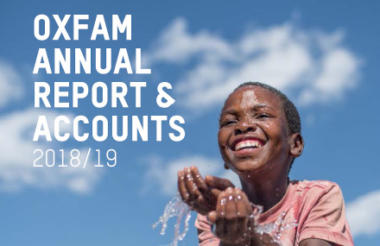Oxfam GB has seen its income increase by nearly £7m to £434m, largely down to an “exceptional year” for legacy income.
The charity published its annual report and accounts for the year to March 2019 yesterday, and thanked its supporters in what its chief executive described as “arguably the most difficult in Oxfam’s 76-year history”.
The report outlines how in the wake of serious safeguarding concerns that emerged at the beginning of 2018, most of the charity's income strands saw a decline.
“Underlying income, which is derived principally from Oxfam GB’s public fundraising and trading operations as well as from a variety of governmental and institutional donors, was and continues to be adversely affected following revelations of the safeguarding issues in Haiti; however, the impact on 2018-19 was mitigated by an exceptional year for legacy income,” it says.
In the weeks following the revelations, 7,000 regular givers cancelled direct debits and Oxfam withdrew from applying for government funding.
Regular giving fell from £52.2m in 2018 to £47m in 2019. Income from government, institutional donors and other public authorities fell from £209.3m to £185.9m. This includes funding from the UK government which reduced its funding to Oxfam from £21.7m to £18.8m.
‘Exceptional’ year for legacies
Legacy income rose from £18m in 2018 to £54.4m in 2019, and while legacy income does tend to be volatile, this has been described in the accounts as “exceptional”.
The report gives no further detail about the reason for the increase, although in August 2018 it was widely reported that the businessman Richard Cousins, who was killed in a plane crash, had left £41m to the charity.
An Oxfam spokesperson said: “We did have an exceptional year for income from over 500 legacies in 2018/19. We are very grateful to the many individuals who kindly left us gifts in their wills. Out of respect for benefactors and their families, we do not comment on individual legacy amounts.”
Oxfam’s trustees have allocated £33.8m of this year’s legacy income to a Future Impact Fund, to “provide targeted and strategic support for Oxfam GB’s work in future years”.
Reached 13 million people
Oxfam said it reached 13 million people with aid and support during the year.
Danny Sriskandarajah, chief executive, said: “We are extremely grateful to all the people who continued to support Oxfam. Last year was arguably the most difficult in Oxfam’s 76-year history and we will strive continue to make improvements to our safeguarding and demonstrate to our supporters that we deserve their trust and support.
“As I said when I joined Oxfam in January this year, my key responsibility will be to help the organisation to act on the lessons learnt from what happened in Haiti and build to become a more open and accountable institution for the future.”
Over 100 roles made redundant
Following the safeguarding scandal, Oxfam needed to reduce its operating costs.
This led to 111.5 full-time equivalent posts being made redundant in 2018/19, which ultimately resulted in 66 members of staff leaving the organisation due to redundancy, with others being redeployed.
Termination costs amounted to £2.1m.
|
Related articles












